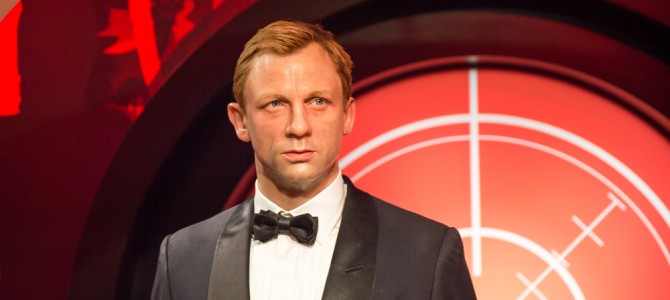
This week, James Bond 24, “Spectre,” finally comes out in the United States, marking the fourth film in Daniel Craig’s tenure as James Bond 007. One of the Bond series’ most interesting aspects is how each movie and each Bond responds to culture at large.
Sean Connery’s movies established the classic formula: gun barrel, pre-credits sequence, theme song and credits, Bond receives a mission, and the plot begins in earnest. In them, Bond usually ends the film with the Bond girl, and more often than not they’re in some odd location (rafts are particularly popular in the Connery movies).
Given this, what Craig’s Bond has kept and what it’s changed is particularly telling of social attitudes today. This shows up especially in the “vices” Bond partakes of—drinking, gambling, smoking, violence, and sex.
Timothy Dalton was the last Bond to smoke cigarettes. Brosnan was allowed one cigar in “Die Another Day,” and in “Tomorrow Never Dies” he even does the public service of reminding the audience that smoking is a filthy habit—as he decks a guy in the face. Bond’s gambling used to consist of games like chemen de fer, but Craig’s Bond is playing Texas Hold ‘Em. That switch purposefully dumbs down the “action” because of what movie producers assume of today’s audience intelligence.
Bond’s drinking, on the other hand, has actually gone up. Craig’s Bond is a lush compared to previous ones, and it fits our society, where most places have banned smoking but excess drinking is a staple.
From Sexy to Stale
The most important thing to look at, though, is sex and its treatment in the Bond series. The old Bonds would be with something like four or five women per movie. There was a brief downturn with Dalton’s Bond being practically a one-woman man in each of his movies. To be fair, that was a response to the AIDS epidemic. (Re-watch “Living Daylights” and think about how Bond has to kill the bad guy to get out of “the friend zone.”)
When Brosnan took over the role, Bond’s womanizing went right back up. “Goldeneye” starts with 007 seducing MI6’s human resources girl after a car chase with a bottle of Bollinger that he keeps chilled in the car! In “Tomorrow Never Dies,” he handles exposition while brushing up on “a little Danish.”
The Craig movies, on the other hand, have been sexless. They’re downright chaste compared to these modern Bonds—the old ones were practically pornographic.
We’re Scared of Heterosexuals
This didn’t come from a vacuum. After “Die Another Day,” producers Barbara Broccoli and Michael Wilson must have realized that we don’t do sex in movies anymore. We’re afraid to approach anything that looks like heterosexual relationships in the modern blockbuster.
Think about all the superhero movies plaguing the box office. None of them have anything approaching an adult relationship. For all of Black Widow and the Hulk’s hand-wringing about being monsters, they’re never even as convincing as Bond and Tiffany Case (Jill St. John in “Diamonds Are Forever”). “Casino Royale,” to its credit, includes a well-established relationship between Bond and Vesper, but in “Quantum” and “Skyfall” there’s nothing, to the point that “Skyfall’s” Bond girl is, for all intents and purposes, M.
Take a look at the opening title sequences for Craig’s movies compared to any previous Bond film. For 21 films, the title sequences were women dancing in silhouette, usually with guns (on Blu-ray they’re less silhouettes and more just nude). By today’s standards those sequences would likely net an R rating.
Stop Being Bond
For all the progressive sex-positive, do what you want talk out there, movies seem to be downright scared to show anything related to sex. When that attitude comes to Bond, you know it’s taken hold.
When added to Bond needing to have someone “in his ear” all the time in “Skyfall,” the general removal of sex and loss of any “sophisticated” vices has taken a character that stood as an intense representation of masculinity and turned him into a unrefined brute, one that must be looked upon as a relic, told what to do by his superiors, and above all kept away from the women.
With “Spectre’s” U.S. release, it will be interesting to see if this Bond film marks a return to form for the series, or if it continues to move down the line of taking one of the most distinctive, long-running franchises in movie history and watering it down until it’s but a weak, drunken shadow of its former self.









